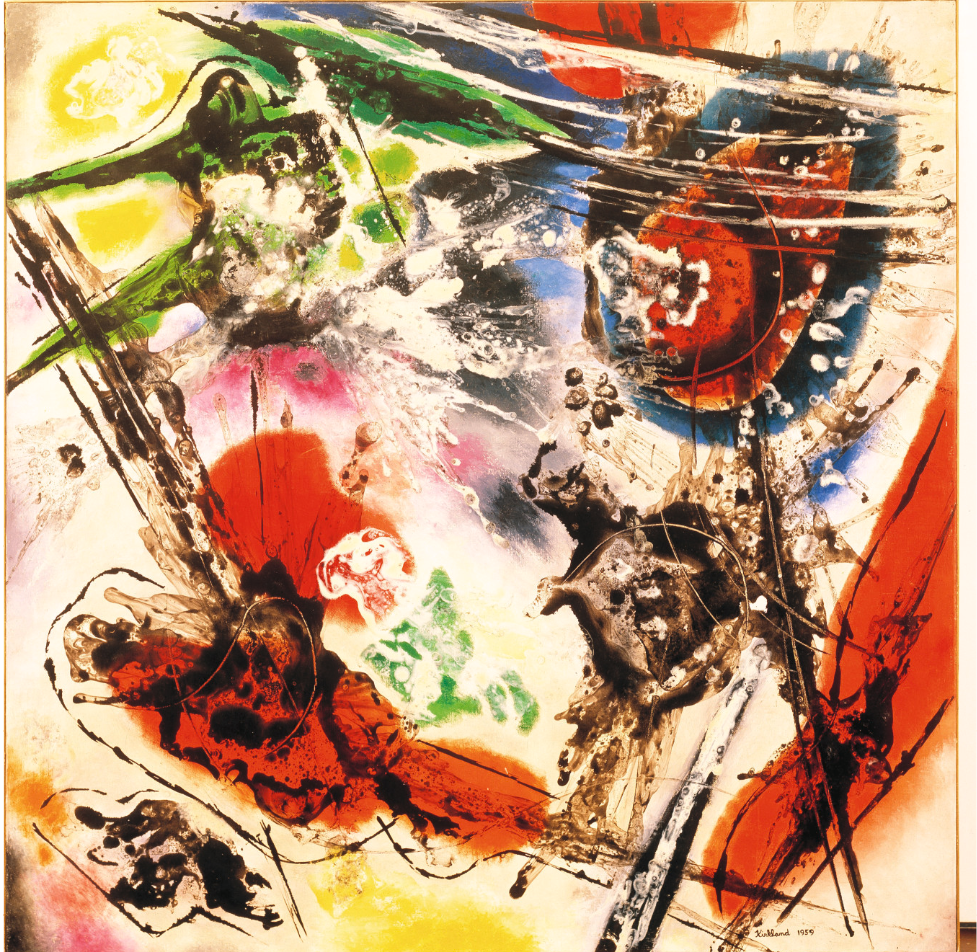The Rocky Mountain Harvard University Club is sponsoring an all-Ivy event at the CU Fiske Planetarium featuring Dr. Erica Nelson (Yale Ph.D., Harvard Hubble fellowship)
Vance Kirkland, Energy of Space, 1959, oil paint and water on linen. Denver Museum of Art
October 20 at 6 PM.
Tickets: $15 adult 18+, children free
Purchase tickets here.
Please bring your family and friends for a mind-expanding presentation on the recent discoveries from the James Webb Space Telescope by CU astrophysics professor Erica Nelson (Yale Ph.D., Harvard Hubble fellowship) followed by a space viewing opportunity at the adjacent, iconically-domed Sommers-Bausch Observatory.
The James Webb Space Telescope (JWST) is one of the greatest achievements of modern astrophysics. After just two years of observations, the James Webb Space Telescope has revolutionized our understanding of the Universe we live in. JWST is a 6.5-meter space telescope sensitive to infrared light, allowing us for the first time to detect the light of galaxies from close to the beginning of time itself. These first galaxies seem to be forming earlier and more rapidly than previously thought, defying predictions from our best theoretical models. JWST now also finds an abundance of over-sized supermassive black holes when the Universe was merely (!) one billion years old. Taken together, our entire knowledge of early galaxy formation is in a state of transformation.
Dr. Nelson will treat us to a smorgasbord of JWST’s recent discoveries and their profound implications for the nature of the universe. Simultaneously, synchronized images form JWST will illumine the planetarium, bringing the far distant universe to you.
Following the presentation, stay for an all-generation visit to the Sommers-Bausch Observatory (SBO), located directly behind Fiske Planetarium. SBO was built in 1953 and housed in CU's first on campus observatory. Part of CU's Astrophysical and Planetary Sciences Department – like the Planetarium itself -- SBO has 3 large telescopes with apertures of 24", 18", and 16", all of which are regularly used for undergraduate research projects. The primary research telescope is the 24", housed in the observatory dome while the 16" & 18" scopes are primarily used for general public viewing.
Seeing JWST images from near the birth of the universe at the Fiske and then walking up to the Observatory to see galaxies, nebulae and other deep sky objects with your own eyes is profound experience that can bring the remote universe home for all ages.
Dr. Nelson completed her PhD at Yale University and a Hubble Fellowship at the Harvard-Smithsonian Center for Astrophysics studying galaxy evolution. She joined the Astrophysics faculty at the University of Colorado, Boulder in September 2020 and uses the JWST to observe and take pictures of the first galaxies to learn what the universe was like at the beginning of time. A world expert in cutting-edge science with JWST, she has over 1000 hours of observation time, has published over 100 papers with the data, and plays a leadership role in the allocation of time and money for the telescope.
This event, organized by the Rocky Mountain Harvard University Club, is open to all alumni of the Colorado Ivy+ network, their friends, and their families.
